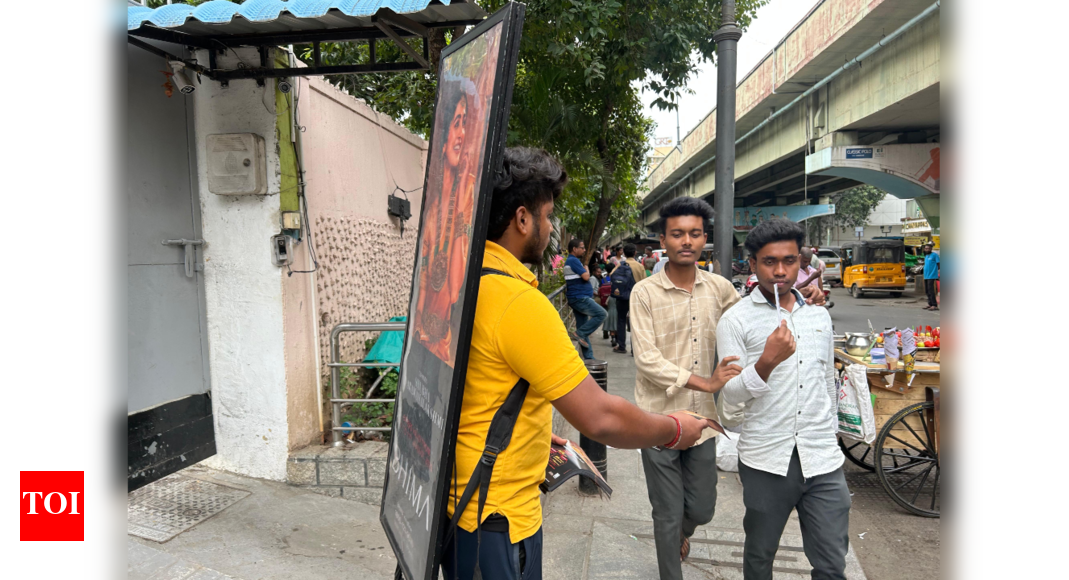
News
August 24, 2025
Chennai Students Turn Human Billboards to Survive
Facing financial hardships, many Indian youngsters are becoming "human ads," wearing display boards to advertise for businesses. Students like Thirulogachandar and Dev Anand brave the heat and occasional humiliation to earn money for their families and education. Activists criticize this practice as exploitative, comparing it to the dehumanization seen in circuses, while some cities are banning it.
**Chennai Students Turn Human Billboards to Survive**
In the bustling city of Chennai, a stark reality is unfolding as students are forced to become "human billboards" to make ends meet. Faced with mounting financial pressures, these youngsters are turning to an unconventional and often demeaning way to earn money: wearing advertising boards and walking through crowded streets.
The sight of young men and women adorned with promotional material for local businesses has become increasingly common. For students like Thirulogachandar and Dev Anand, this is not a matter of choice, but a necessity. They brave the scorching Chennai heat and endure the occasional stares and jeers, all in the hopes of earning enough to support their families and continue their education. Every rupee earned is a step closer to a better future, a future that might otherwise be out of reach.
The life of a human billboard is far from glamorous. They spend hours walking under the sun, carrying heavy boards, and repeating slogans. The pay is meager, but for many, it is the only option available. They often face the discomfort of wearing ill-fitting boards and the social awkwardness of being a walking advertisement.
However, this practice is not without its critics. Social activists are raising concerns about the exploitative nature of employing students in this manner. They argue that it reduces individuals to mere commodities, comparing it to the dehumanization often seen in circuses. Critics highlight the potential for physical strain and mental stress, as well as the impact on the students' dignity and self-esteem.
The debate surrounding human billboards is gaining momentum, with some cities considering outright bans on the practice. The ethical implications of using vulnerable individuals as advertising platforms are being questioned, prompting discussions about alternative solutions to address the underlying issues of poverty and lack of educational opportunities. The question remains: how can society provide better support for these struggling students, allowing them to pursue their education with dignity and without resorting to such desperate measures?
In the bustling city of Chennai, a stark reality is unfolding as students are forced to become "human billboards" to make ends meet. Faced with mounting financial pressures, these youngsters are turning to an unconventional and often demeaning way to earn money: wearing advertising boards and walking through crowded streets.
The sight of young men and women adorned with promotional material for local businesses has become increasingly common. For students like Thirulogachandar and Dev Anand, this is not a matter of choice, but a necessity. They brave the scorching Chennai heat and endure the occasional stares and jeers, all in the hopes of earning enough to support their families and continue their education. Every rupee earned is a step closer to a better future, a future that might otherwise be out of reach.
The life of a human billboard is far from glamorous. They spend hours walking under the sun, carrying heavy boards, and repeating slogans. The pay is meager, but for many, it is the only option available. They often face the discomfort of wearing ill-fitting boards and the social awkwardness of being a walking advertisement.
However, this practice is not without its critics. Social activists are raising concerns about the exploitative nature of employing students in this manner. They argue that it reduces individuals to mere commodities, comparing it to the dehumanization often seen in circuses. Critics highlight the potential for physical strain and mental stress, as well as the impact on the students' dignity and self-esteem.
The debate surrounding human billboards is gaining momentum, with some cities considering outright bans on the practice. The ethical implications of using vulnerable individuals as advertising platforms are being questioned, prompting discussions about alternative solutions to address the underlying issues of poverty and lack of educational opportunities. The question remains: how can society provide better support for these struggling students, allowing them to pursue their education with dignity and without resorting to such desperate measures?
Category:
Politics